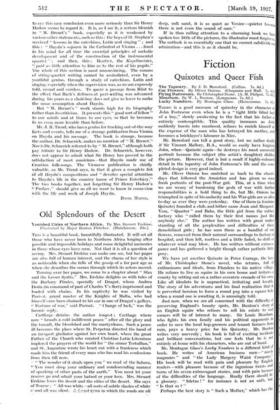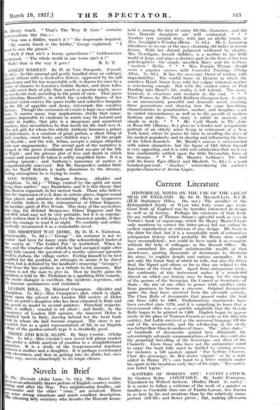Fiction
Quixotes and Queer Fish
Lucky Numbers. By Montague Glass. (Heinemann. 7s. 6e1.)
THERE is a good measure of quixotry in the character of John Fortescue even when he is a " tight little blind bud of a boy," slowly awakening to the fact that his father i, entirely contemptible. This quality increases as Join suddenly bursts into manhood, refuses to enrich himself at the expense of the man who has betrayed his mother, awl becomes a bricklayer's labourer in Nice.
Mr. Beresford can tell a good story, but we rather doubt if Sir Vincent Mallory, B.A., would so easily have forgiven John, when—Quixote again—he destroys his most successful portrait because the subject (the artist's daughter) dislikes the picture. However, that is but a small if highly-coloured detail in the tapestry of John Fortescue's life and the eons pleted design is very good indeed.
Mr. Oliver Onions has snatched us back to the chaotic days that followed the Armistice and has given us sonic fresh portraits of the post-War girl. This, at a time when we are weary of burdening the gods of war with further responsibilities is a bold thing to do, but Mr. Onions has triumphed in spite of his audacity and his War-girls are as alive to-day as ever they were yesterday. One of them (a feminine Quixote) founded a club, and hither came Joan and Margaret. Vera, " Quarter " and Babs, the little girl from the rubber factory who " called them by their first names just like anybody else." The author has written with great under- standing of all the perplexities and difficulties of these demobilized girls ; he has seen them as a handful of cut flowers, removed from their natural surroundings to factory or hospital, and then left, rootless and a little faded, to drift on whatever wind may blow. He has written without extrava- gance and has gathered a bright though rather pathetic little posy.
We have yet another Quixote in Peter Currage, the hero of Mr. Christopher Stone's novel, who returns, full of enthusiasms and ideals, from Flanders to his native village. He refuses to live as squire in his own house and irritates a county by setting out on a rather eccentric crusade of his own. Like all idealists he is unpractical, irritating and lovable. The story of his adventures and his final realization that it is perverted heroism to force a round peg into a square hole when a round one is awaiting it, is amusingly told. Just now, when we are all concerned with the difficulty of preserving England's beauty spots, Mr. Buxton's story of an English squire who refuses to sell his estate to coal owners will be of interest to many. Sir Louis Mearharn, who fights his own family and his political opponents in order to save the local hop-growers and tenant farmers from ruin, pays a heavy price for his Quixotry. Mr. Buxton writes very unevenly ; his book is full of exciting incident' and brilliant conversations, but one feels that he is not entirely at home with his characters, who are out of hand. Mr. Montague Glass's Lucky Numbers is a different kind of book. He writes of American business men—" magnates " and " the Lady Margery Waist CompanY. His book will be read with pain and pleasure by English readers--with pleasure becatise of the ingenious twists and turns of his seven extravagant stories, and with pain becall of the difficulties of the language.. Really there should he a glossary. " Sdetzo ! " for instance is not an oath, but
" Is that so ? "
Perhaps the best story is " Such' a Mother," which has the
0. Henry touch. " That's The Way It Goes contains conversations like this :— You was a fiddler, wasn't it ? ". the impresario inquired. "My cousin Jacob is the fiddler," George explained. " I used to was the pianist."
\\-ell if that ain't a funny quincidenee ! Goldenweiser exclaimed. " The whole world in one town ain't it ?"
Well ! that is the way it goes ! - B. E. T.































































 Previous page
Previous page